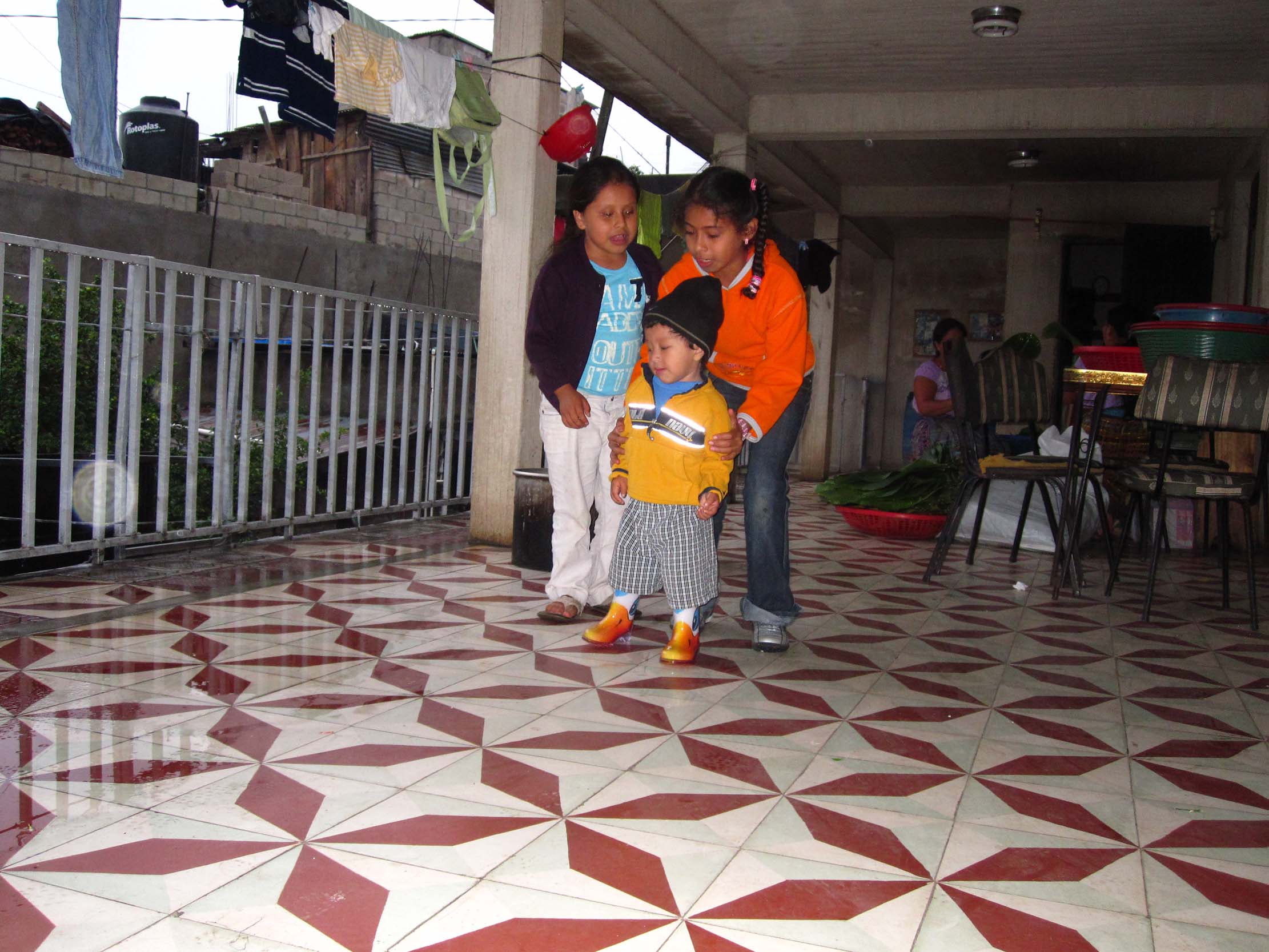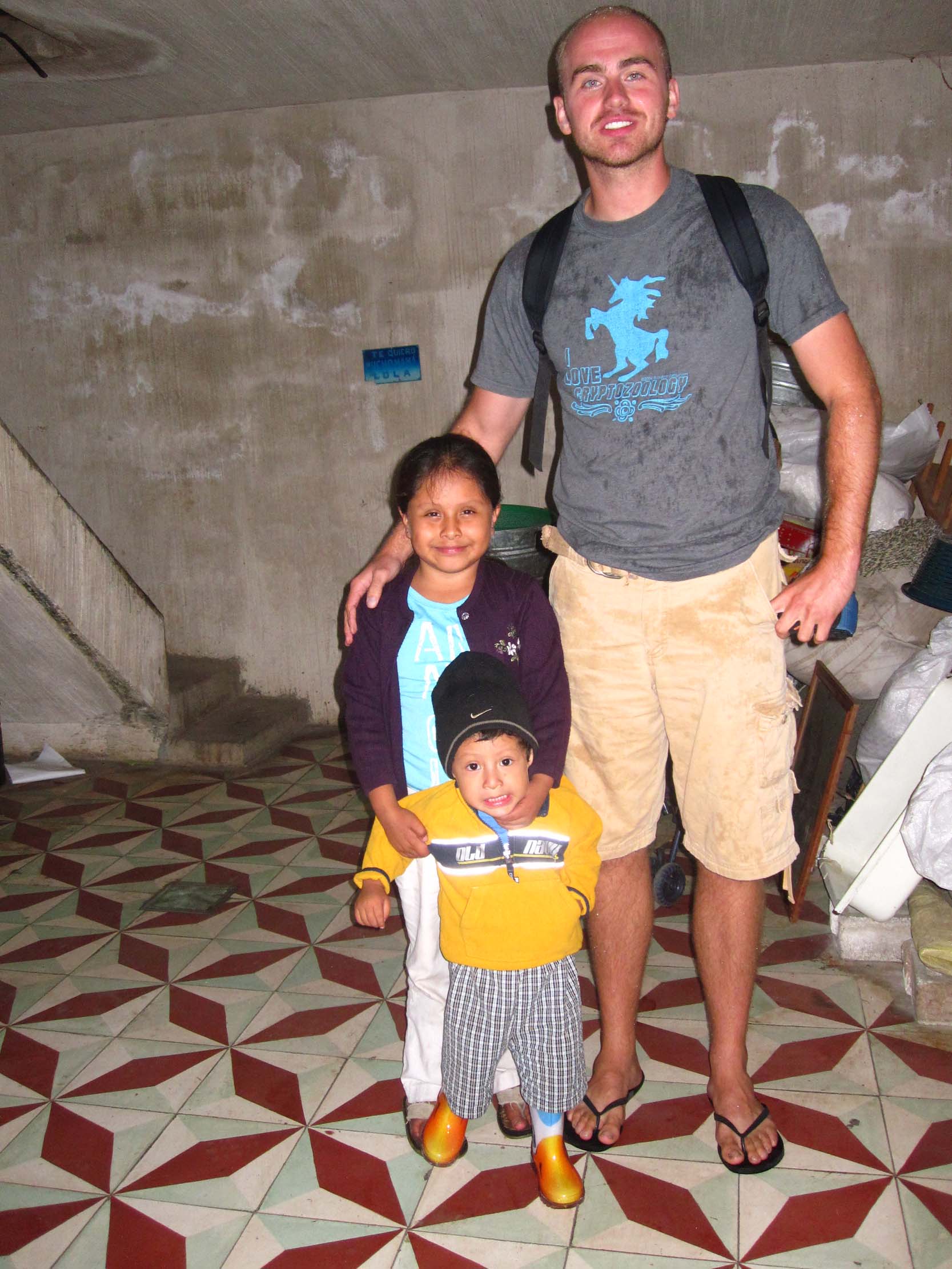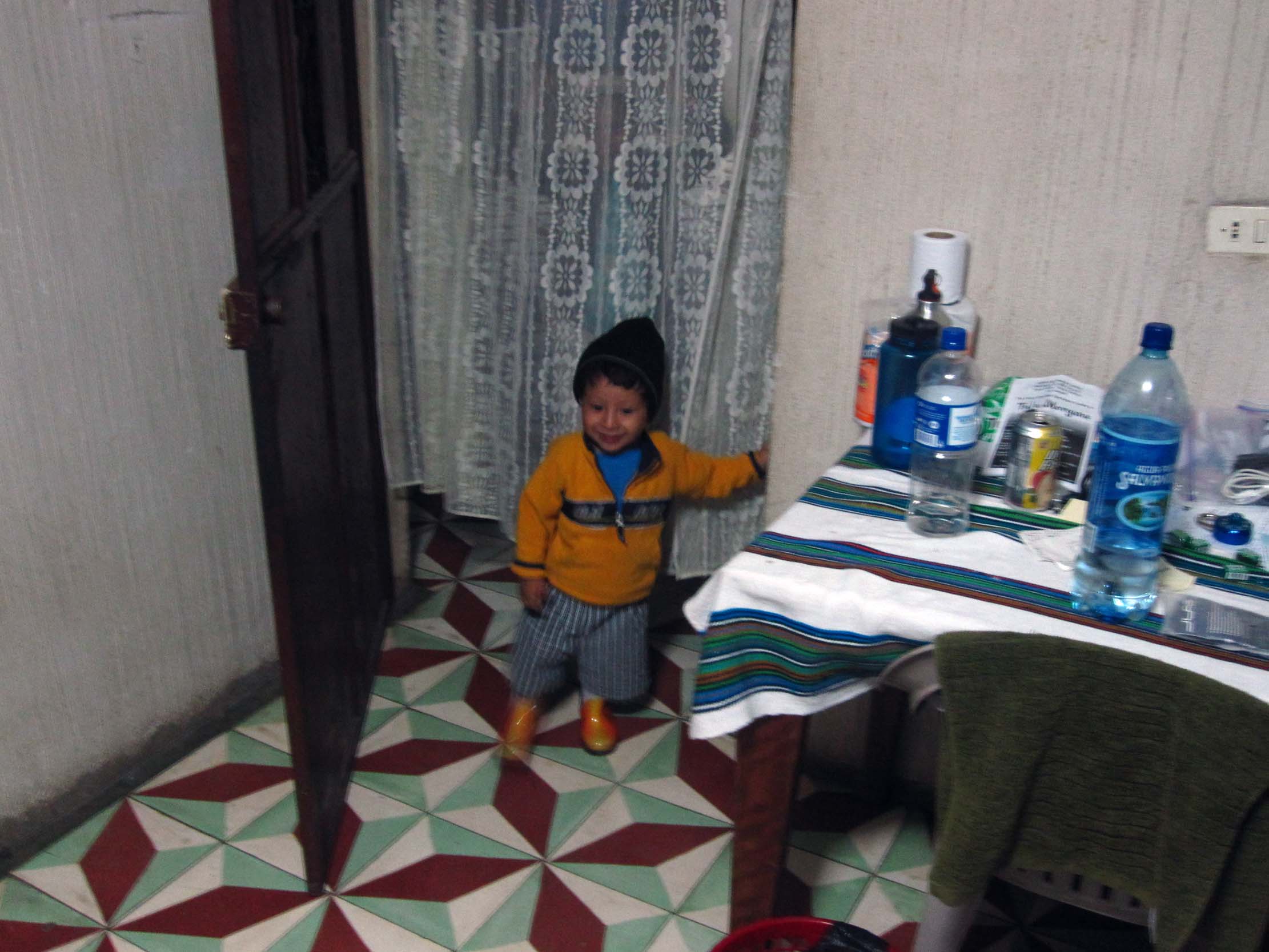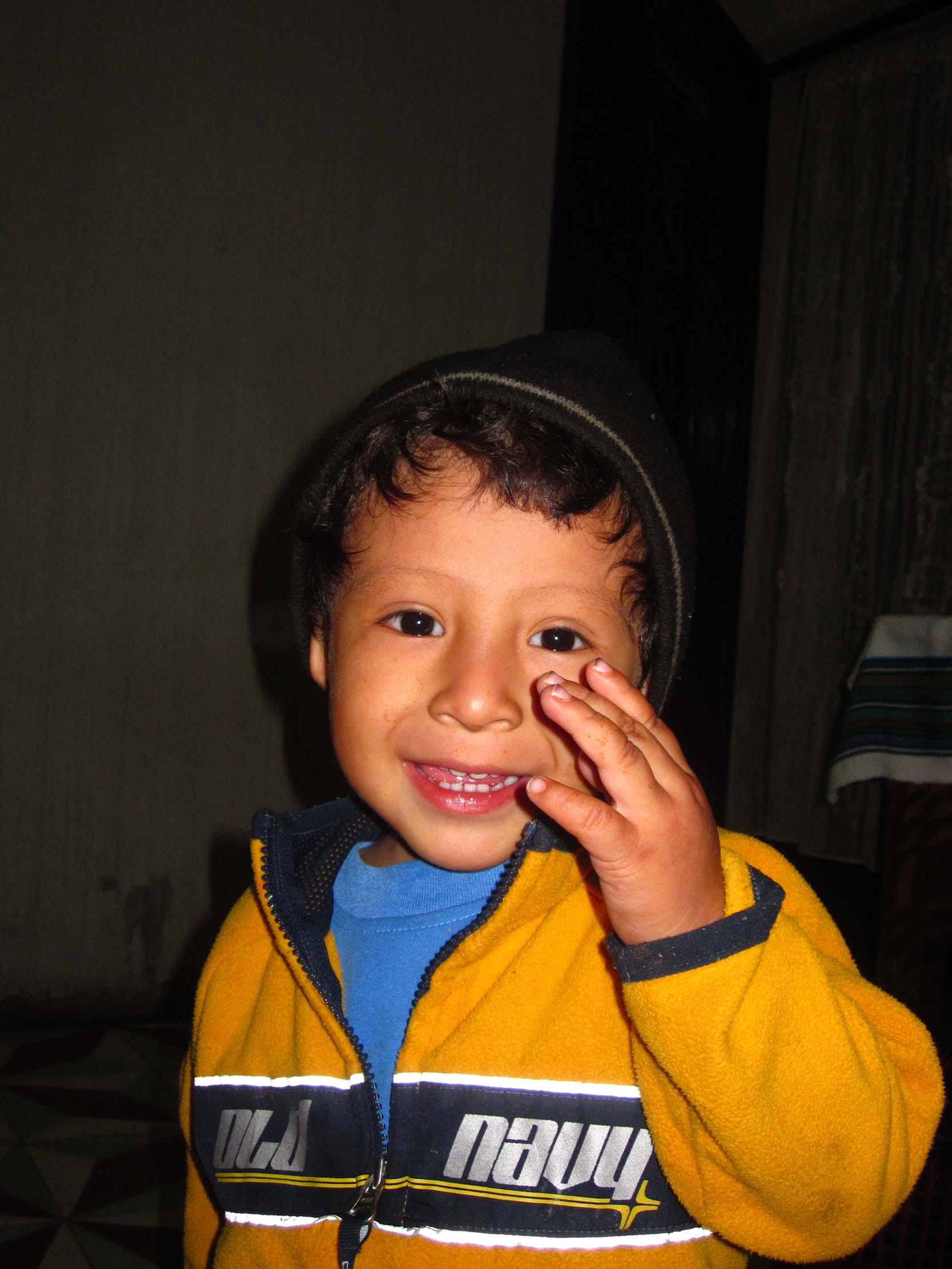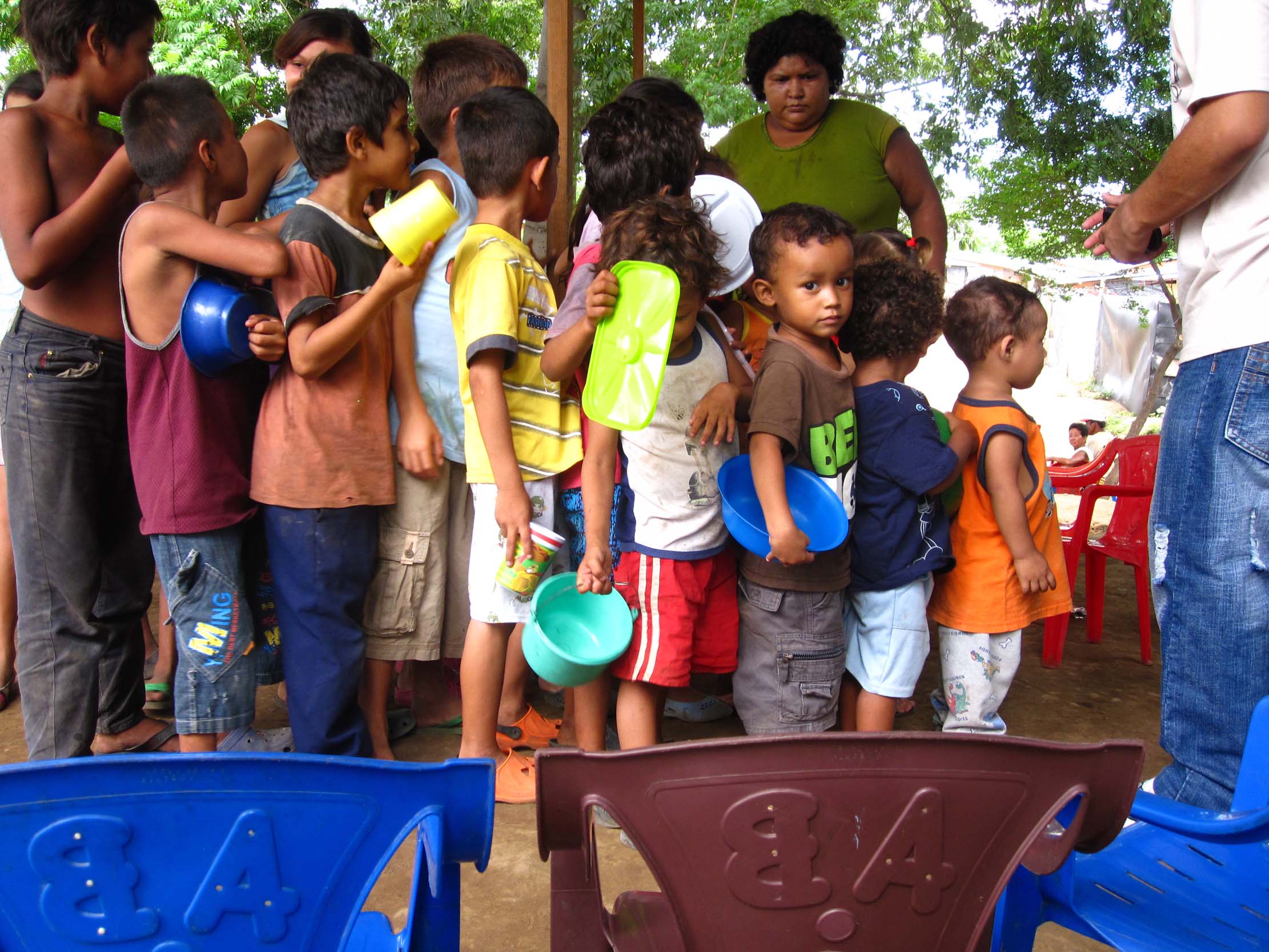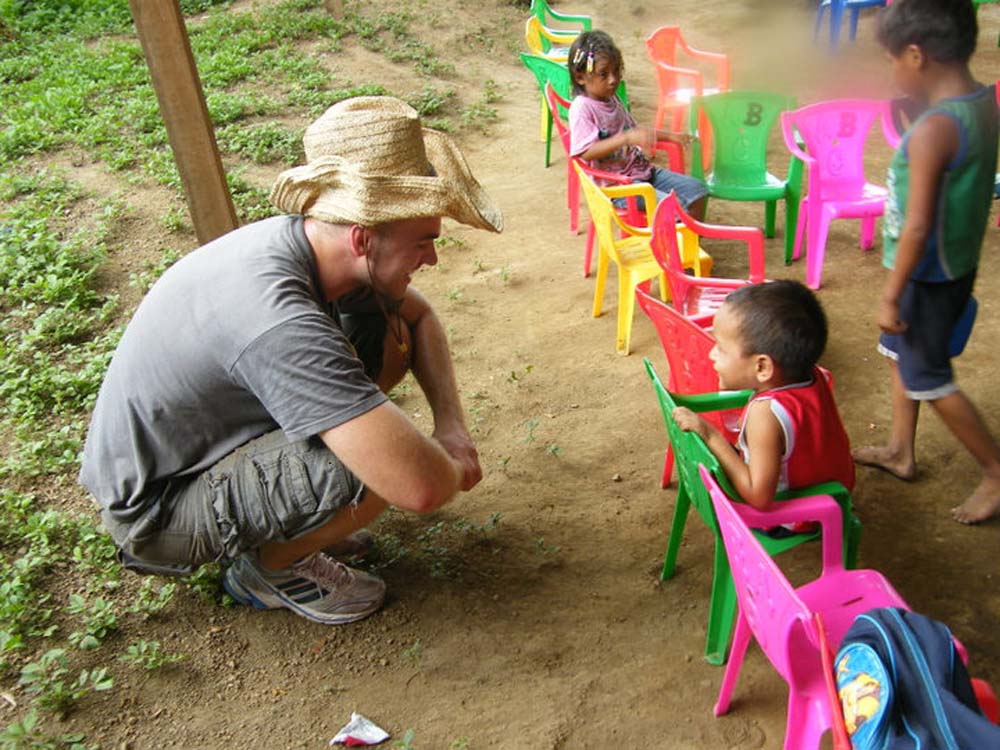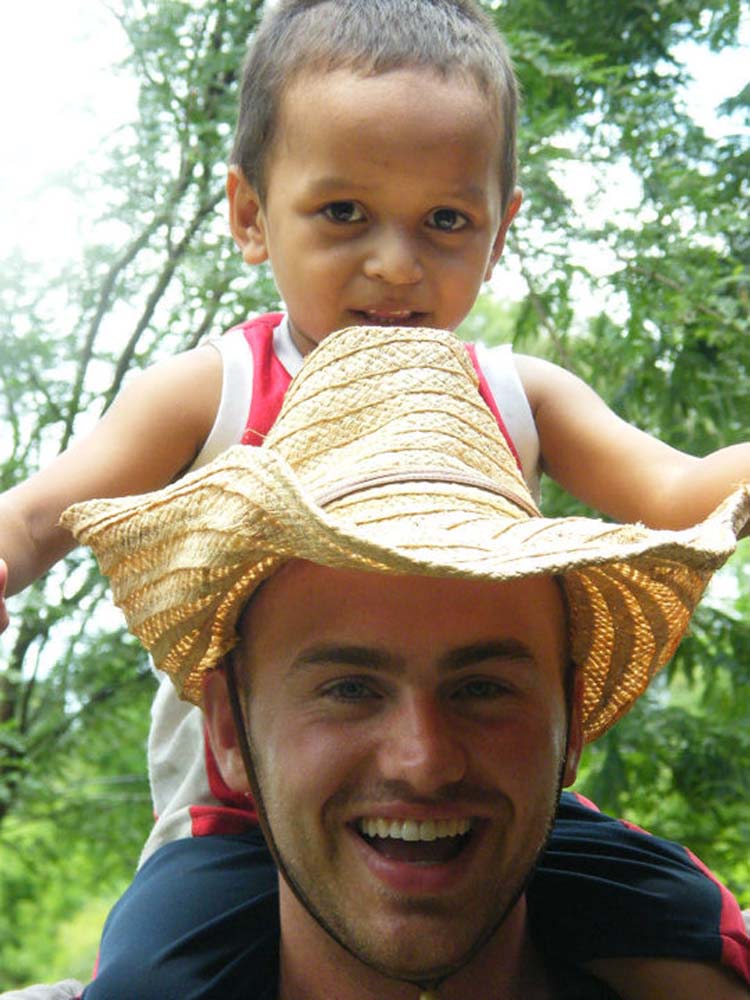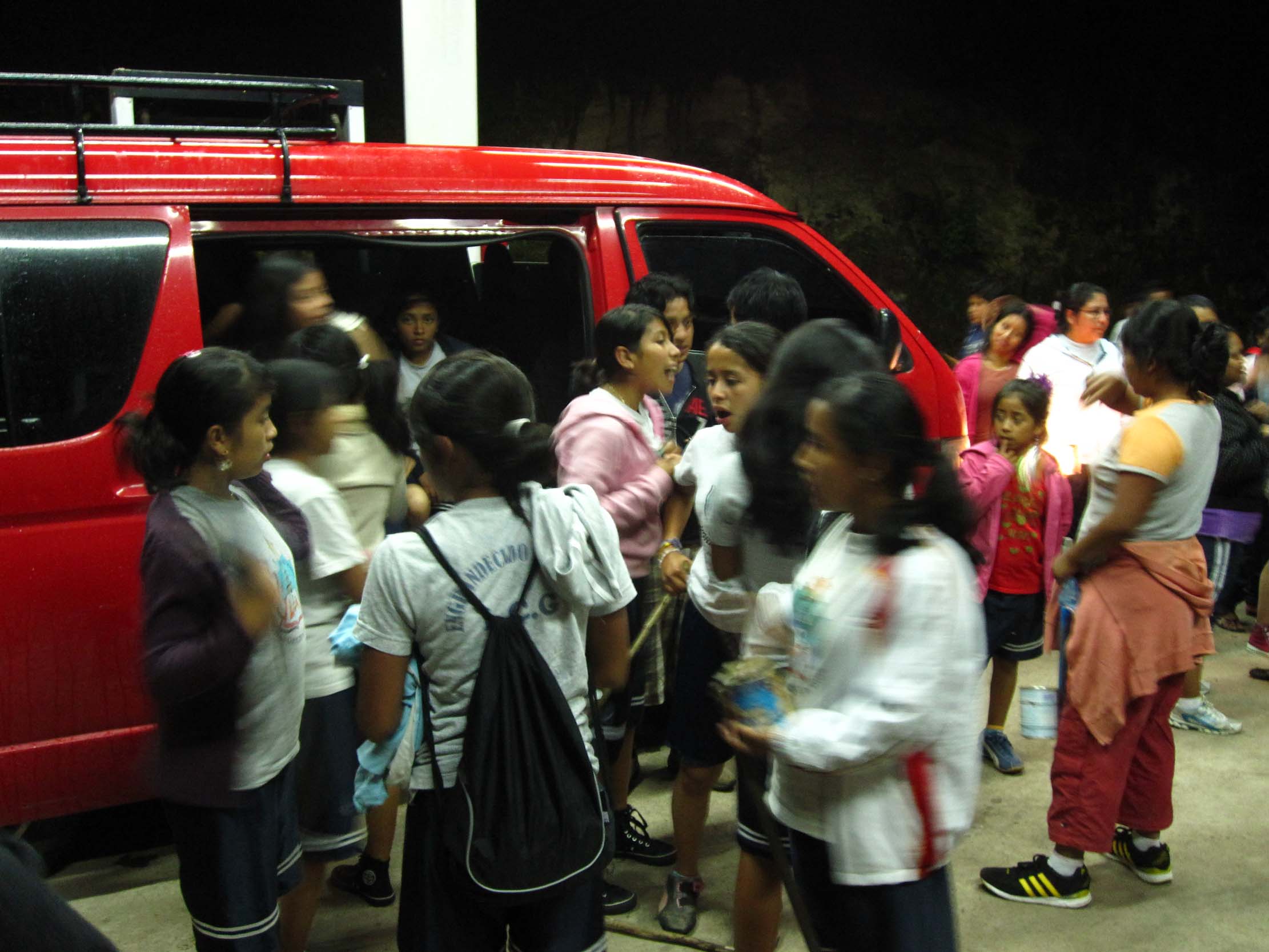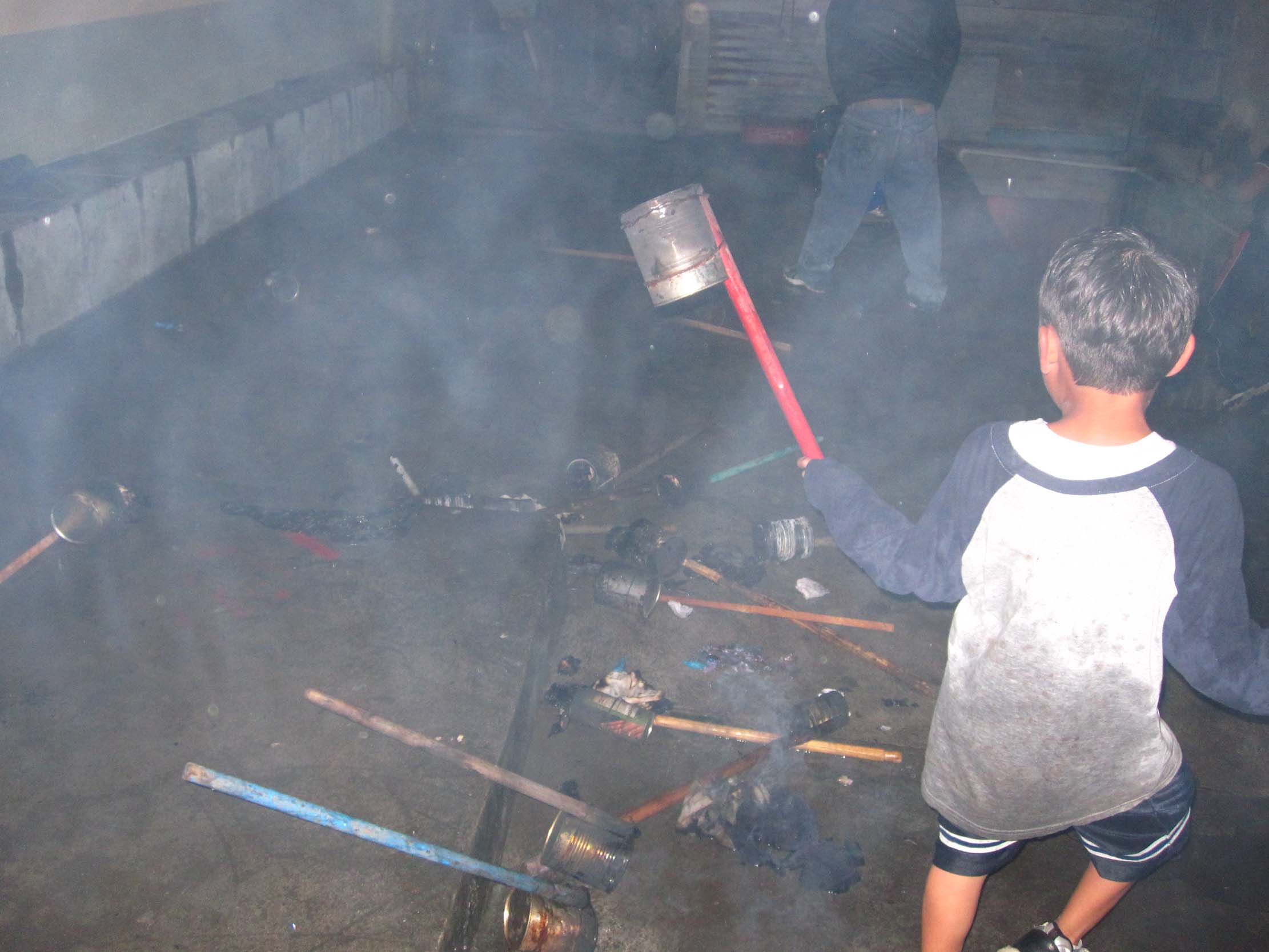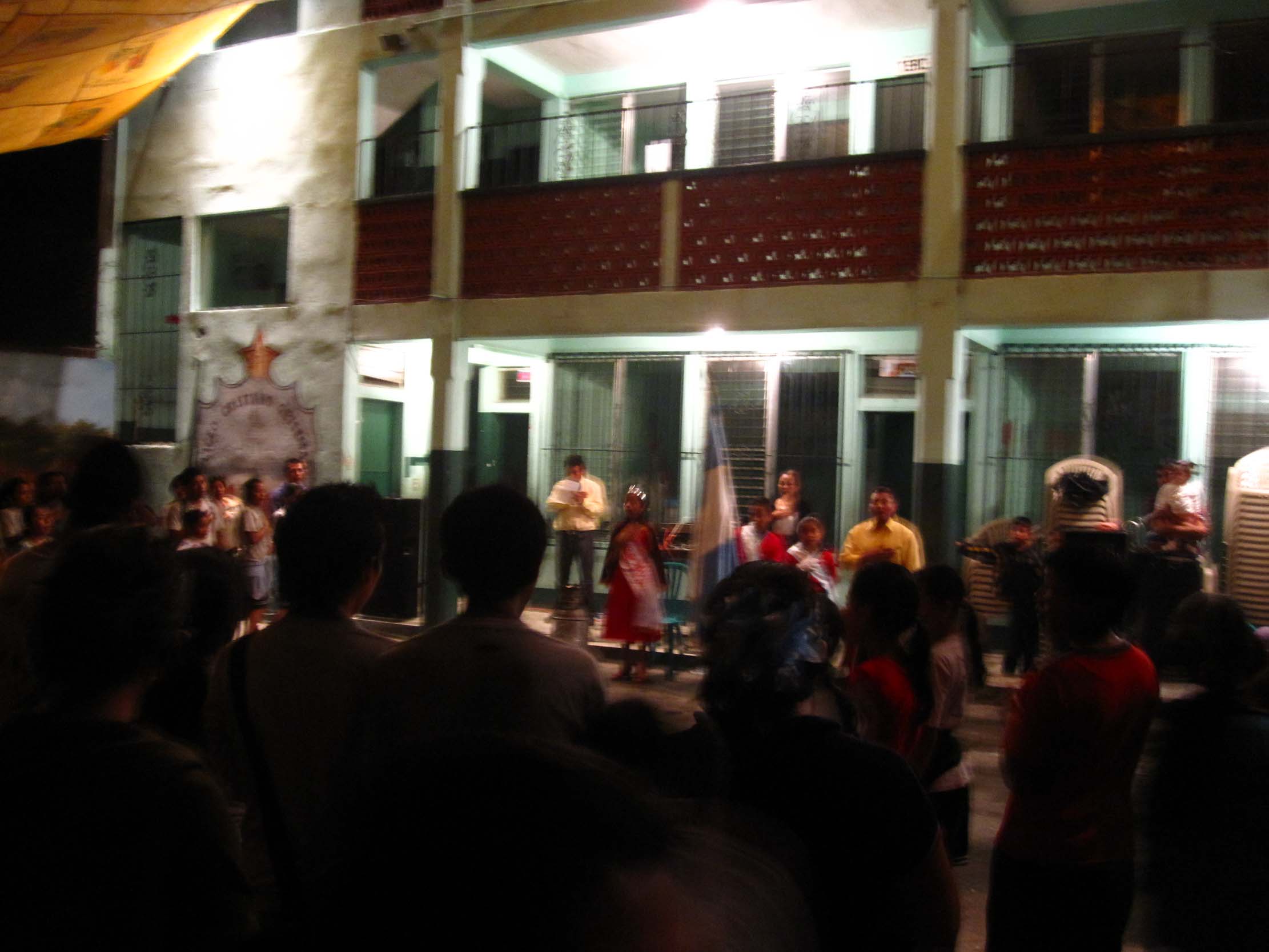Sunday, August 15th, Flori and I went to the town center to watch her kids participate in a parade to celebrate their school’s anniversary. Over 1,000 people attended this parade to support the town or their children. I have never seen so many colors of dress, nor the multitudes of cute Guatemalan kids. Many of the photos below were taken “from the hip” in that I just held the camera at my side as to not attract attention. I think I was able to capture some pretty interesting expressions on the faces of some children.
Monthly Archives: August 2010
Tamales and Tiny Hector
I was playing guitar when Tiny Hector (my nickname for Hector’s nephew) walked into my room and presented me with a large banana leaf. The women were busy preparing a large batch of tamales and were going to wrap this mix of ground corn, chicken, and fruit with large banana leaves. I asked Hector (his real name) if he had been helping the women wrap the 300 tamales that they had planned to make that evening. His response was a presentation of the leaf to me, so I took it from him, looked it over, smiled, and then gave it back. He put some of it in his mouth, and proceeded to tear up the rest into tiny pieces.
I suppose this is how Tiny Hector helps when the women are working. I love this kid. He’s so sincere, so honest, and he doesn’t speak much of any language. Most of the family here speaks Spanish and Tz’utujil. (Tz’utujil is one of the local Mayan languages – I’ll write more on this later.) If nothing else, Tiny Hector provides a respite from the hard work during the nine hour marathon needed to prepare 300 tamales.
From what I understood with my limited Spanish, the women were making tamales for a special day of celebration. Twelve women had gathered from the local church at our house, and had been working all day to make these tamales. The Cortez family was excited for me to try tamales. Apparently, everyone loves tamales in Guatemala, and sometimes they get together to make them for special occasions. Hector asked me if it was ok that the women would be working on the tamales outside my room. He said they may be up late. I told him it wouldn’t bother me. So the women labored while I slept.
The next morning, at breakfast I asked Flori where Hector was. She said he was sleeping; he was up late last night. I asked her how late she and the women stayed up to make the tamales. She said she went to bed at 3:00 and woke up at 5:30 to begin the house work. “Wow,” I thought, “these women are so dedicated.”
Later, at lunch, I was talking about all the tomale making with Hector. He said he slept in because he was up late at night and up early in the morning to deliver some of the food to a local church and to drop the rest of the food off at his church. I asked, “Oh, so the tamales are for a celebration tonight at your church? You usually have church on a Tuesday, right.” He said that they did, but tonight was special. Tonight his brother was going to speak.
I made a new friend at church recently, his name is Nicholas, and he’s a farmer. He stands about 5’1” and wears black cowboy boots. The very first night I attended, he was the first person to greet me. He has a big family and has been very involved in the church. I asked Nicholas, “Is there always a dinner after church?” Nicholas responded, “No, tonight is a special celebration.”
I find it funny that since I don’t know how to speak Spanish well, I find myself gathering clues most of the time and trying to assemble a complete story. Very often, I ask the same questions, and with repeated answers, I eventually get the picture. Somehow, I still didn’t know why today was a big day.
The service proceeded as normal, and when the Pastor was finishing his message, he asked Hector’s brother to come up and say a few words. Hector’s brother is really involved in the church, as I’ve seen his name on the main board a few times as a deacon or a greeter.
Hector started talking about his past. He talked about his family and his job and how there was a period where things weren’t good. I gathered that some really bad things had happened, really bad, and as he humbly told his story, tears started to fall from his eyes. He had to pause to continue, but at the points where he thanked his family for their loyalty and their trust, he could barely speak.
The pastor came back up and put his arm around him and asked if people wanted to come forward to pray with the family. I felt like I was witnessing a very important event in the history of the church, in the history of Hector’s family, and something uniquely special about this community. It was a humble gathering, and hugs and kisses were exchanged by the family in front of the church. No pomp and circumstance, no loud music, just a community of people standing in the middle of the church happy to celebrate a man that came home.
The pastor announced that the youth would serve the church, the whole church. Regulars, full-fledged members, and people who just happened to walk in that night. Everyone would be fed.
As the youth were coming out to serve everyone, I asked Nicholas to explain to me what tonight was about. He said that Hector’s brother was in a really bad place in his life, but a year ago on this day, he walked back into the church and turned his back on a lifestyle that had damaged his family. It was the anniversary of him becoming a Christian, of him coming home.
I keep having these moments where I feel like time slows down and all the Spanish clues I’ve gathered throughout the day are now forming a cohesive picture.
The women were up late.
The women labored while I slept.
The women stayed up until 3:00am to make over 300 tamales.
The men stayed up til 3:00 as well.
The men got up again at 4:30 to deliver the food.
They made over 300 tamales for their family, their friends, and for strangers.
For an entire day, a community labored to celebrate a man who came home. They thought it proper to have a banquet, but not just for the family. Everyone. Anyone. Anyone who walked in that door of the church got fed. Anyone with dirty clothes or dirty hands. Anyone who had already eaten that evening, and anyone that hadn’t yet eaten that day.
They all labored while I slept.
I couldn’t believe it.
Tiny Hector stood in my room with a banana leaf in hand smiling at me, wanting me to join in.
Tiny Hector is Hector’s brothers son.
Tiny Hector labored while I slept to celebrate his dad coming home.
Even now, as I write this. A heavy emotional weight pulls at my heart. All this kindness and sincerity. All the humble workers. All the ordinary people making food to eat. The lack of pomp and circumstance. The lack of applause. The lack of tables as we ate our food . . . we all ate the tamales in our laps.
It’s all so heavy in my heart.
And probably the best thing is what happened when we got home. After three hours of celebration, we returned home. Hector’s dad asked me if I had ever eaten a tamale before. I said I hadn’t, but I really, really liked them. He asked how many I ate today. I told him I ate four.
He opened up his mouth (which was missing six front teeth) and put his hands on his belly and laughed a big hearty full-bellied laugh.
“I had eight,” he said.
Somehow, it was clear to me that this was the last puzzle piece of this story. The one that seemed to make everything fit together. The family labored while I slept so that everyone could celebrate, and anyone could eat. After all, eating is for family and for friends, and for foreigners. And when you eat tamales, those delicious tamales, the goal is to eat until you’re full, until the entire family is full.
The labor had been completed. We celebrated and ate until our bellies were full, and now it was time to rest, for everyone to rest.
I went back to my room and set down my things. I found a tiny piece of a banana leaf and set it on my desk, and I smiled as I turned out the light.
Nicaragua August 2010 Trip Update
From August 2nd to August 9th I traveled with West End Presbyterian Church (WEPC) to the Casa Bernabe orphanage in Vera Cruz, Nicaragua which is just outside of Managua city. A local church, Verbo, has been incredibly active in and around the area of Managua with new church plants and running orphanages with an awesome organization Orphan Network. You can view my pictures here: Facebook Album.
I Almost Joined A Worship Band
On Friday, I went to church with Hector and set in motion some plans to perform live in front of the entire congregation. Hector goes to an evangelical church called Nuevo Vino on the edge of town. We went early because he’s a greeter, which makes sense for Hector, because more and more I see how he knows everyone in this town of 13,000. It’s simply a joy to ride around in his truck. At every turn he will yell out the window to someone he knows and they will smile and respond with some Spanish slang.
While Hector is greeting people, I sit down in the 2nd row. I figure that the front is equivalent to the back of the church because I’m not really going to avoid people coming up to me and introducing themselves no matter where I sit. There just aren’t 6’3″ white people who hang out in Guatemalan churches on Friday nights.
A young man came up and introduced himself. He knew a bit of English, but he mostly spoke in Spanish. He said that Saturday night was a service for “jovenes” or “young people. He asked me if I played any instrument. I said that I played guitar and sang a bit. He was impressed. He said that I should come at 5:00. Someone else told me that the service was at 7:00. I was trying to figure out why there were two different times for the service, but like most things here, I just give up and go with the flow.
Saturday rolls around and Hector and I head to the church. There aren’t really that many people there at all. Only the young men that I met last night. One guy in particular, Andres, is very friendly, and as it turns out, he’s the piano player at the church. We walked up to the stage and I picked up a guitar and tried to tune it. It was old and wasn’t very good quality, so I had a lot of trouble with it, so he gave me a bass instead. I don’t really play bass.
We started jamming to some songs that I kind of knew and then he comes over to me and starts talking about the order of songs. He proceeds to explain what chords I need for the verse and then for the chorus. I’m having trouble with the songs because when Guatemalans write and read music they use the Solfeggio
(Do-Re-Mi-Fa-So-La-Ti-Do) and not the notes (C-D-E-F-G-A-B-C).
A few girls pick up microphones and start singing the songs. They sound like they know what they are doing. Another young man sits down and starts playing the drums. It’s at this point where I get a bit leery about the situation:
- We’re singing Spanish songs that I’m not familiar with.
- I’m playing a bass and I really can’t hear what notes I’m playing because it’s so loud.
- I can’t transcribe his solfeggio annotations or my own handwriting.
- It’s getting closer and closer to 7:00.
- People are coming into the church.
I started praying one of those prayers for the Lord to have mercy on me. I’m not sure which transgressions merit the recompense of having to play 12 Spanish songs on a bass where I can’t even hear the notes. Yes, I am starting to freak out.
Just then, one of the girls lays down the microphone and says goodbye. The drummer looks at his watch and sticks the drumsticks in his pocket. I’m beginning to think my prayer has paid off.
Andres turns off the keyboard and I ask him if he’s in the group tonight.
“Tonight? No, tonight we sing with the CD.”
Whew . . . I almost joined a worship band. Thank goodness. Turns out, you can come at 5:00 if you want to practice music, otherwise, show up at 7:00 with the rest of the jovenes.
Pancho, the Caballero – A True Gentleman
In Nicaragua, getting out of bed on Thursday morning was difficult. Everyday, we awoke to sore muscles, but this day I knew we were going to visit La Chureca, the enormous dump in Nicaragua. Emotionally, I didn’t feel ready to visit the dump. I was not looking forward to what I was going to see. I don’t know if it was the impending guilt or shame for living such a comfortable lifestyle, knowing that the people I was to meet had next to nothing, or that I was probably going to see something that would shake me up inside.
Riding in the back of a pickup into La Chureca my nostrils were assaulted by the foul smells. It was probably the worst smell I’ve ever experienced. Food scraps, soiled clothes, and used toilet paper (since no one is allowed to put used toilet paper down the toilet) get thrown away and everything gets hauled to the dump. Consequently, when the trash workers are burning the heap, you smell everything undesirable. It was extremely hot and humid that day, so I also smelled rotten food and other sun-baked refuse. Birds circled over the heads of the trash workers who wore long pants and shirts and rubber boots. They carried with them long poles that looked like forks and they looked for items of value: clothes, plastics, glass, metals, anything that could be sold or used for their dwellings. People can make a living at the dump, and have been doing so for quite some time.
La Chureca began almost 40 years ago after a hurricane destroyed the homesteads of Nicaraguans. Families began to move into the area because they were able to earn a living picking saleable things from the trash. The government gave some subsidies for housing with the perspective that it was all temporary community – these people would leave as soon as conditions improved. Today there are more than 500 families living at the dump. Families are large at the dump, so 500 families can mean anywhere from 2,000 to 3,000 people.
A beacon of hope in the area is the local church run by Pastors Ramon and Miriam Baca. Inititally they had it inside the walls of the dump so that it was close to the people living in the community. Recently, they changed the location of the church to outside the dump so that all churchgoers would feel the literal and figurative sense of life beyond the walls of the mountains of trash. We participated in the daily feeding station that the local church operated.
After a short tour of the area, I think most of our group was exhausted from the shock of viewing the living conditions. For me, I know I have never been in a place this bad. I almost feel shame for saying that because what happened next shocked me more than the unsanitary abodes we toured.
About 50 children sat in colored plastic chairs to wait patiently for lunch. They were all smiling and playing with each other. Brothers, sisters, cousins, and friends – these kids were part of a tight-knit community in La Chureca. Despite not having shoes, or clean hands or faces, these kids were still kids.
They took joy in poking each other, putting their arms around the shoulders of a friend, and greeting all the Americans with waves and hugs. I thought to myself, “How can such beauty and warmth exist in such a terrible place?”
As I was trying to process this in my mind, a little guy turned around and started talking to me. I learned that his name was Pancho. Pancho didn’t have a plate with him so I asked him if he wanted to eat. He said that he had already eaten and all he wanted was for me to put him on my shoulders. He walked out from the area of chairs and motioned for me to crouch down. He walked around to my back and began to climb up to my shoulders. I was thinking to myself that those little barefeet were incredibly dirty. I probably had little footprints on my back.
Pancho started to say “Caballo, Caballo!” which means “horse” in Spanish. So I galloped around the yard with Pancho the cowboy – the Caballero – on my shoulders. He was squealing with laughter. I was smiling too. I knew that there is not much I could do for him at that moment except to show him love and kindness.
As I was galloping around, Pancho was saying something to me that I had to stop and listen for him to repeat again. “Como?” I asked.
Pancho said (translated):
“Let’s go to my house.”
“Where is your house?”
“Over there, just up the street.”
“You live close to here?”
“Yes, lets go to my house and say hi to mama . . .”
Whew.
At that moment I got a big lump in my throat. I felt as though time stopped and everything about this dump, all my perceptions came crashing down. Pancho, the little caballero, did what anyone does when playing with new friends – he invited me to his house to say hi to his mama. I imagined what his house might look like . . . the dirt floors, the rusted metal sheets pieced together to form a wall, broken furniture, holes in the roof, and a makeshift table where he and his brothers and sisters would eat what little food his mother prepared.
I wanted to cry.
How could this little boy with dirty feet, dirty hands, and a dirty face, wearing a shirt that was so old the printed graphic had faded away, be so kind, so full of joy, so much like every other child in America?
See, the most shocking thing for me that day was not that La Chuleca was so dirty and desolate, it’s that there was a such a bright spirit of happiness in those kids, in that community, and in my friend Pancho.
I had to put Pancho down because we were leaving. He said to me that he wanted to ride on my shoulders again. I said, “I’m sorry Pancho. I have to leave.” He said, “Ok.” And then he said something that I couldn’t understand. I wished that I knew what he meant. As I jumped back on the pickup to leave, Pancho came to the edge of the feeding area and waved and said it again. I still didn’t know what it meant, but my guess is that it was an invitation to come back and play, because I still needed to meet his mama . . .
A “Man Voyage” – When You Are the Only One in Your Wolfpack
Monday was a long day of traveling for me. The team from our church got up at 3:30 to get to the airport in time for our 6:40 flight. A day earlier we traveled two hours away to a rural village to visit the Verbo church and to help them run a soccer camp and carnival. I was exhausted and didn’t sleep much the night before.
My team chose the option to get bumped on their flight to El Salvador to get a flight voucher and a hot breakfast which meant that I’d have to navigate the Salvadorian airport and find my transport to the bus station. Upon arriving in El Salvador, I quickly scouted out the area and made my way to the airline counter. I tried to see if I could get bumped for the flight back to the USA which would give me a flight voucher. They told me to come back in 2 hours. I didn’t have to hours so I made my way down to the immigration and customs.
They stamped my passport and I exited the airport into a heat blanket of the El Salvadorian climate. Immediately, taxi drivers surrounded me like vultures. Every transportation hub has tons of people trying to sell you goods or take you somewhere. I was able to communicate that I needed to go to the Tica Bus station and I pointed on the map to where the information center pointed me to.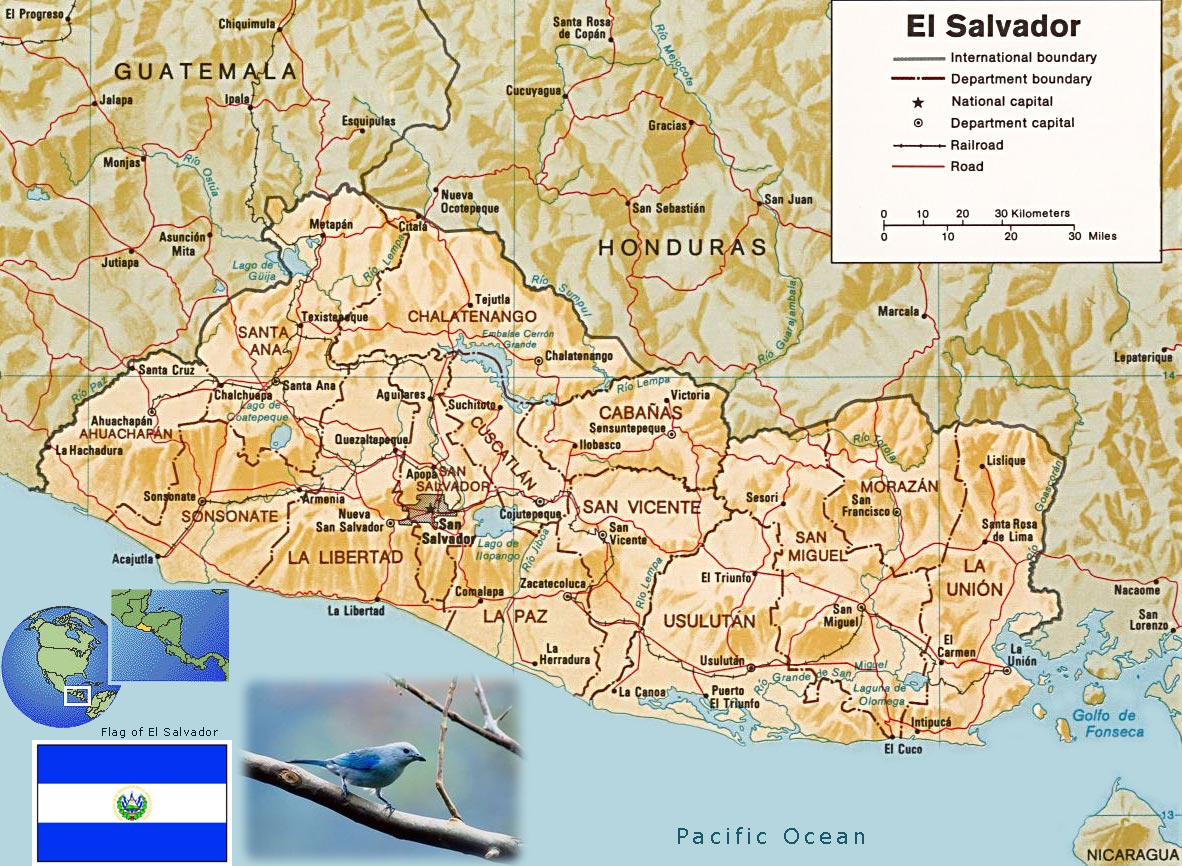
I jumped into the Toyota Hilux (the Tacoma version in CA) with Manuel and we headed into El Salvador. It was a 35 minute drive into the city. San Salvador is beautiful. The mountains stood against the bustling city of three million people. We passed the metro center where I saw signs for Tica Bus, but Manuel was taking me to the place I pointed out on the map. We arrived at a tiny station where I saw no signs for Tica Bus and got a bit worried. I knew that King Quality was a good bus service and they were running a route to Guatemala. Manuel helped me find the Guatemalan desk and pointed to the sign that said it would leave at 2:00pm. I originally planned to leave El Salvador at 1:00pm, so now I was going to be late to meet my shuttle.
The following is a follow-up email I sent to my friends from Nicaragua:
Hey dudes! It’s too bad y’all couldn’t join me on the man voyage I had in El Salvador. Carl emailed me to see how it went, and I decided to send an email to all of you. (The “Man Voyage” was what we named our planned excursion into San Salvador. They were unable to complete the “man voyage” because their flight was bumped, so it was just me traveling in my own wolf pack.)
First of all, I haven’t found the kind of discounts at the department stores that I used to frequent. I’m waiting for a good sale before I drop a load of cash.
Secondly, the man voyage would have been a bit trickier than we first had envisioned. Whilst the airport was pretty nice and well air conditioned. The El Salvadorian climate felt like wearing a hot soaked blanket in a dressing room – if you know what I mean. To even get outside you have to pay $10 to enter the country.
Thirdly, it’s a 30 min trip into the city, and directly outside the airport there is not mucho. I did get to ride in a Toyota Hilux with Manuel, my taxi driver. I think he may have been a Jehovah’s Witness. He had a copy of a worship service printout in his seat, but I don’t know enough spanish or enough about El Salvador to corroborate this.
Fourthly, if you tell an El Salvadorian that you want to go the Tica Bus station and you point to another bus station on the map, he will take you to the place you pointed to. King Quality Bus Lines leave at 2:00 which meant I’d get to Guate later. With the extra time, I ate lunch next door in a little cafeteria.
Fifthly, it was a 5 hour trip to Guate. Oh yeah, and we crossed a border. Somehow I forgot about that. No biggie though, you don’t have to pay anything to enter Guate, but you do have to deal with 8 money changers who board the bus and 9 women selling food.
Sixthly, when you get to Guate, it’s important to know where the bus station is, and don’t get off the bus just cause everyone else is. Haha. I got off at Hotel Del Istmo, and when I finally called the place I was staying in Guate, he said “Why did you get off there instead of the Bus Station?”
I have no explanation for getting on at the wrong bus station in El Salv and getting off in the wrong bus stop in Guate other than the fact that I’m in Spanish School right now for a few good reasons.
I stayed at a really nice and inexpensive place in Guate at the night and met some really cool Americans and Spaniards (still reveling in their World Cup Victory).
The next day a shuttle picked me up and drove me 7 hours to the language school. The trip is usually 4 hours . . . that is if you pick it up at the main terminal and not the bed & breakfast I stayed at.
In summary, I had an awesome and safe adventure to Guate and currently reside in a gorgeous area of Lake Atitlan.
I hope in the future that we can join in on a man voyage together. At least when i come back at the end of September I’d like to get together and look at some pictures and try one of those Nica cigars.
Hope you guys are doing well and I hope that your shopping excursions have brought your homes much joy and that you won’t have to use your gift receipts.
God Bless!
-Aaron
Patricia’s Bed & Breakfast – Guatemala City
If you need to fly into or out of Guatemala City, stay at Patricia’s Bed & Breakfast www.PatriciasHotel.com. It’s clean, spacious, quiet, and Alberto speaks English and will pick you up from the airport which is just 2 minutes away. It’s $14 a night which includes a hot shower, a clean room to yourself, breakfast in the morning, and transportation to and from the airport.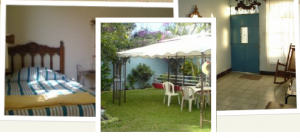
When I finally arrived in Guatemala, I got off at the wrong stop. I should have just gotten off at the bus station. I didn’t really know the difference, and it didn’t really matter because Alberto was waiting for a phone call anyway. He drove a really nice shuttle bus and he and his dad or friend helped me get my luggage. (I couldn’t tell the relationship. Maybe Patricia is his mother, if that’s the case, then the mystery of the identity of the employees of the B&B is solved. On the way back to the house we talked mostly about the World Cup, and how even though Spain is not a Central American country it was better that they won than the Netherlands.
Patricia’s Bed & Breakfast is a really nice affordable hostel. I say hostel because it is very much the feel of the hostel – the world travelers, the different languages, the common meeting area, and the conversations between new friends. For me, it brought back feelings of when I was a student in England and used to travel on the weekends. When you travel, it feels like you lose some of your national identity and are immediately thrown into a larger category of people – world citizens. Conversations take the form of generalized things: where to go, what to see, how to stay healthy, funny experiences, and trying to sort out the differences in the culture. It was really refreshing to be back in this environment.
During my night in the hostel, I met three young people from Spain, all on “holiday” finishing up two weeks traveling around Guatemala. They were still elated after the victory of Spain in the World Cup and told me about the week long celebrations in the streets. Jenny was from North Carolina doing a Ph.D. in epidemiology, and did three weeks of language school in Shela, Guatemala. Next to me at the table was a psychologist and her son from New York. Over in the corner were three Germans; a man and his son, and a friend. They were trying to figure out how to call home. I’m pretty sure it was early there in their home country, so I believe they resorted to checking email.
It was hard to leave the team from West End Presbyterian church. They helped me process my first week in Central America. I had some good friends on the team and I really enjoyed having fun with them and getting to know Nicaragua. Most importantly though, I needed to have friends and familiar people to help me begin to process the poverty and beauty we were experiencing in Nicaragua. I’ll begin to unpack those things this week when I have time in language school.
Angel with an Apron
Sometimes angels appear in most unusual places wearing the strangest accessories.
I will call this angel Abuelita which means “little grandmother” because she reminded me of my dad’s mother. In the tiny Hotel del Istmo in Guatemala City, she was leading the conversation of her two coworkers and the young lady working behind the desk. It was clear she was the matriarch. I immediately loved her composure. She laughed with her whole body and when she smiled, I saw all the white teeth that she had. Around her traditional, conservative dress she wore an apron that could hold quite a lot of things.
Sitting there in the lobby, Abuelita greeted a man who came up to her. This man owed her some money and she pulled out a huge stack of cash: dollars and quetzales. She must have been the money changer here. A lot of people probably came and went from this place and she was the one who controlled the bank. I could tell she was in charge, and she liked taking the point of command as she gathered the questions of her friends and asked them to me in Spanish. She told me that I was very tall and quite handsome and she wanted to know how tall I was in centimeters. I told her I didn’t know, but I could tell her what I was in feet and inches. She said that was just fine and she said that I was much taller than one of her sons.
Out from the apron came an address book where she read to me the address of her son that lived in California and apparently was much shorter than me. Her well-worn address book contained all the addresses and phone numbers of her family, scribbled and rewritten as the places and numbers changed. She kept it close to her, in that apron, maybe a reminder that while the family she loved had moved far away, she always knew where they resided.
I first noticed this apron when I stepped into the Hotel del Istmo as the rain came pouring down in Guatemala City. From the apron appeared a cell phone which seemed much too flashy to come from such a modest woman. She asked if I needed to use the phone and I smiled and nodded that I did. Apparently, I had gotten off at the wrong station, and I had stepped inside to get out of the rain and to evade the taxi drivers. I must have looked confused as I stood there with my luggage, rain pouring down, wearing my beat up straw hat, and looking at an address scrawled on a piece of paper. It was with her smile and grace that she extended this loving hand to me with her cell phone in it. As I tried to read off the paper the address and phone number, she realized that she had better dial the number because there was no way I was going to be able to speak Spanish to whoever answered that line.
Abuelita asked me for a dollar to use her phone, I was more than happy to oblige, and now I know how she came to acquire such a wad of money. Alberto arrived 15 minutes later and helped me get my luggage into the vehicle. Strangely enough, Albert was the name of one of my grandfathers. I smiled and waved to the women of the hotel lobby and said “God Bless You” in Spanish. Abuelita returned those words to me with a smile, and waved one hand, the other she kept in the apron, to safeguard a few important things for travelers like me.
Every Christian School Should Celebrate Their Anniversaries Like This
At dinner tonight, Hector (my host family father) asked me if I wanted to come to the celebration of Lolita’s school. I said, “Sure, why not. That sounds like fun.” Actually, I said, “Yes.” But the former phrase is what I wanted to say. From what I gathered from his description, the kids would run into the town of San Pedro to their school.
Apparently, while carrying torches:
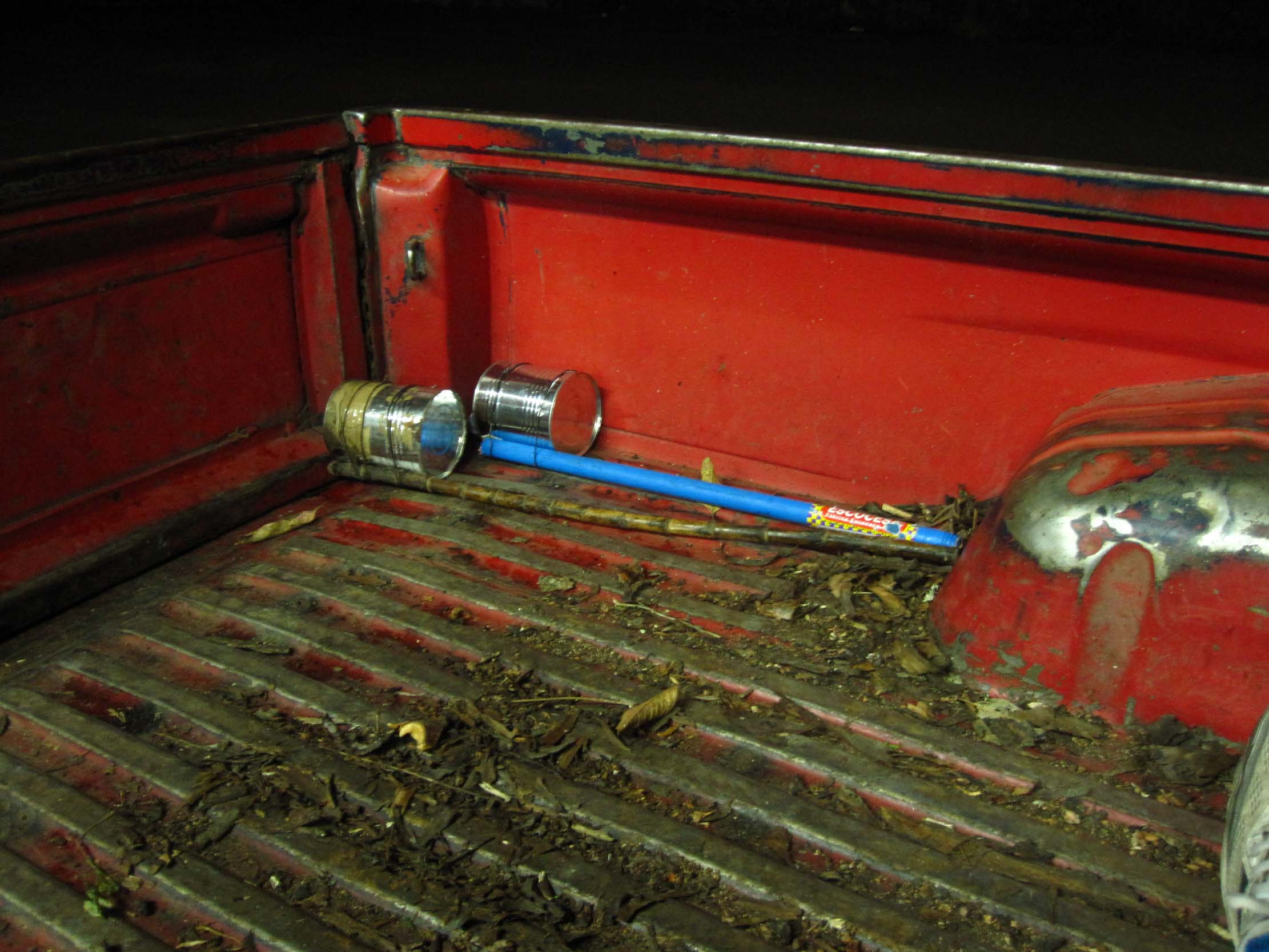
I thought, “Yeah, that’s what I would do if I were celebrating an anniversary.” Seriously though, I am always up for running or running at night or running with fire. I think this night was a reason why I am living with a host family and a huge reason why I took a break to learn Spanish and travel. Albeit, I had no idea what was going on.
I felt just fine, hanging out in the back of the truck with Hector Junior (pictured right) and his cousin, Lawrence.
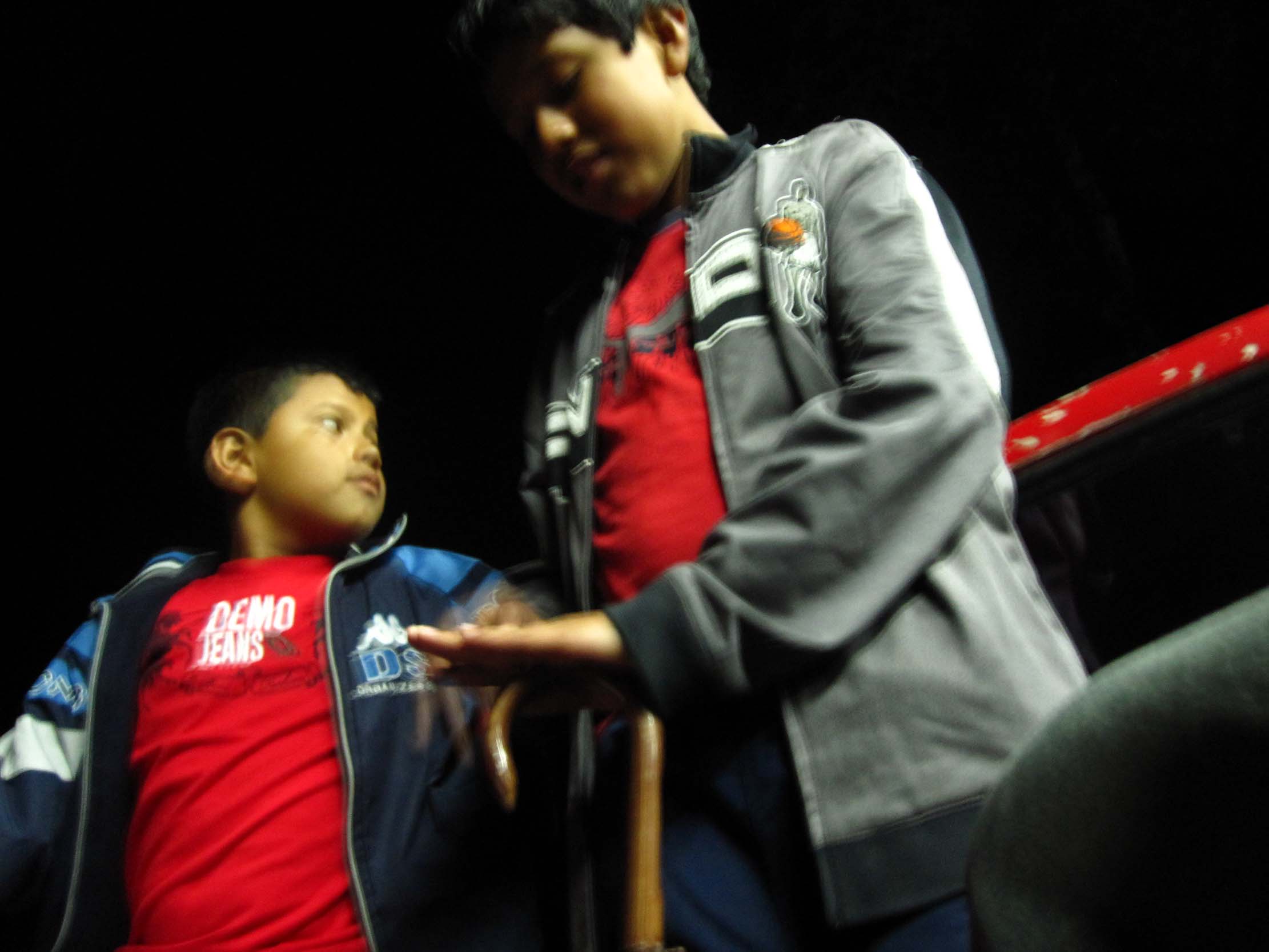
We were hanging out in a gas station just outside of town. I asked Hector how far the kids were going to run. He said, “Only 1 kilometer. Do you want to run as well?” I heavily considered it, but being that it was cold and it was starting to rain. I oped not to.
These kids were pumped and ready.
You can see that they have on their gym clothes. Which is fine, but it’s like freezing now and really raining.
We finally make it to the start line and these kids are starting to ignite their torches.
The picture really doesn’t do it justice, so check out this video.
After about 15 minutes riding in the back of Hector’s truck, the kids finally reach their destination. They all run into the small hallway and up to their school. They dumped their torches to the right, and this little guy was in charge of ensuring that all the lit torches were properly distinguished.
Now it was time for the closing words of the celebration. They sang the school song and the Guatemalan national anthem. It was beautiful.
CRISTIANO LICEO GESTEMANI, is a ministry of Gethsemane Baptist Church of San Pedro La Laguna, Solola – Guatemala. Dedicated to the training of students with biblical principles and moral values.
Here is a video that they put together that will show you what the school is like:

